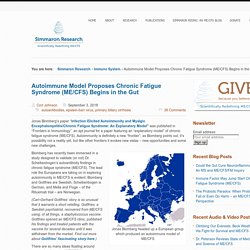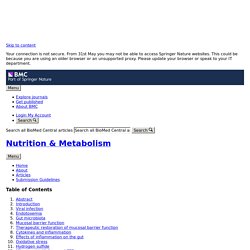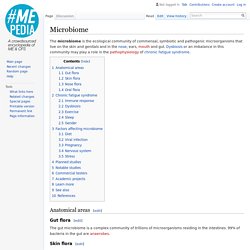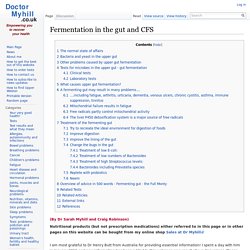

When the leaky gut was fixed with diet and supplements and the levels of LPS were reduced, patients improved and some got better. The body sees LPS as a toxin and mounts an immune response against it. So healing the gut is an important piece of the treatment puzzle. Also check out the resources for CFS/ME in the Medical Topics Collection.
CFS/ME may have autoimmune characteristics. Check out the autoimmune gut health connection by clicking the up button and finding the Autoimmune Disorders and the Gut Microbiome collection.
Chronic Fatigue Syndrome (CFS) / Myalgic Encephalomyelitis (ME) / System Exertion Intolerance Disease (SEID)
Leaky Gut / Endotoxemia.
Using a Microbiome Approach to Treat ME. CFS/ME and Candida. The Gut Microbiome and Neuroinflammation. Ian Lipkin’s CII team shows gut bacteria in ME/CFS may influence disease severity – The Microbe Discovery Project. “Much like IBS, ME/CFS may involve a breakdown in the bidirectional communication between the brain and the gut mediated by bacteria, their metabolites, and the molecules they influence.

By identifying the specific bacteria involved, we are one step closer to more accurate diagnosis and targeted therapies.” ~ Ian Lipkin, director of CII and John Snow Professor of Epidemiology at Columbia’s Mailman School. Anticipated work from the CII teams’ early investigative research into ME/CFS is starting to be published. The new study in the journal Microbiome from Drs Ian Lipkin and Mady Horning at Columbia University Center for Infection and Immunity (CII) finds abnormal levels of certain types of bacteria in the gut microbiome of ME/CFS patients. It also found disturbances in bacterial metabolic pathways that, in combination with the changes in bacteria, may influence disease severity. Chronic Fatigue Syndrome Linked to Imbalanced Microbiome. Autoimmune Model Proposes Chronic Fatigue Syndrome (ME/CFS) Begins in the Gut.
Jonas Blomberg’s paper “Infection Elicited Autoimmunity and Myalgic Encephalomyelitis/Chronic Fatigue Syndrome: An Explanatory Model” was published in “Frontiers in Immunology”, an apt journal for a paper featuring an “explanatory model” of chronic fatigue syndrome (ME/CFS).

Autoimmunity is definitely a new “frontier”; as Blomberg points out, it’s possibility not a reality yet, but like other frontiers it evokes new vistas – new opportunities and some new challenges. Jonas Blomberg headed up a European group which produced an autoimmune model of ME/CFS Blomberg has recently been immersed in a study designed to validate (or not) Dr. Scheibenbogen’s autoantibody findings in chronic fatigue syndrome (ME/CFS). The lead role the Europeans are taking on in exploring autoimmunity in ME/CFS is evident: Blomberg and Gottfries are Swedish, Scheibenbogen is German, and Mella and Fluge – of the Rituximab trial – are Norwegian. A Genetic Predisposition. A Microbiome model for CFS and its implications. Gut inflammation in chronic fatigue syndrome. Chronic fatigue syndrome (CFS) is a clinical condition characterized by persistent and unexplained relapsing fatigue that is worsened by physical and mental exertion [1, 2].

According to the Centers for Disease Control (CDC) report, the overall prevalence of CFS in the USA is as many as 4 million people [3, 4]. Up to 80% of those affected are women [5]. These individuals suffer from severe fatigue that impairs daily activity, diminishes quality of life (QOL) for years, and has no known cure. CFS represents an economic burden for society and healthcare institutions [6]. The CDC originally proposed the term CFS in 1988. The Role of the Microbiota and Potential for Dietary Intervention in Chronic Fatigue Syndrome - The Gut-Brain Axis - Chapter 21. 2016, Pages 439–463 Edited By Niall Hyland and Catherine Stanton Abstract Chronic fatigue syndrome (CFS) is a complex disorder characterized by unexplained, relapsing fatigue that significantly impairs daily activity and diminishes quality of life.

In addition to disabling fatigue, CFS patients often experience gastrointestinal (GI) symptoms. In fact, many CFS patients have been diagnosed with irritable bowel syndrome (IBS), the most prevalent functional GI disorder. Gut Microbiome: 33 Ways Gut Bacteria Affect Your Body and Mind. We share our bodies with our gut microbes. In fact, you could even say that a lot of what we are depends on the bacteria we carry.
They can make us thin or fat, healthy or sick, happy or depressed. Science is just beginning to understand all the ways in which gut microbes affect our lives. In this post, we review what is known about gut bacteria so far, including the ways in which they are shaping our bodies and our minds. Read on to find out: Striving for true remission of CFS, chronic Lyme, FM, IBS etc. Reversal of Refractory Ulcerative Colitis and Severe Chronic Fatigue Syndrome Symptoms Arising from. Microbiome - MEpedia - An encyclopedia of ME and CFS. The microbiome is the ecological community of commensal, symbiotic and pathogenic microorganisms that live on the skin and genitals and in the nose, ears, mouth and gut.

Dysbiosis or an imbalance in this community may play a role in the pathophysiology of chronic fatigue syndrome. Anatomical areas[edit] Fermentation in the gut and CFS. (By Dr Sarah Myhill and Craig Robinson) Nutritional products (but not prescription medications) either referred to in this page or in other pages on this website can be bought from my online shop Sales at Dr Myhill I am most grateful to Dr Henry Butt from Australia for providing essential information!

I spent a day with him in January 2015 and new information has been added to this webpage as a result of our discussions. Please see below for full details. The human gut is almost unique amongst mammals - the upper gut is a near-sterile, digesting carnivorous gut (like a dog's or a cat's) evolved to deal with meat and fat, whilst the lower gut (large bowel or colon) is full of bacteria and is a fermenting, vegetarian gut (like a horse's or cow's) evolved to digest vegetables and fibre. Fixing Leaky Gut Helps ME/CFS, and Sometimes Achieves Full Remission. Gut bacteria provide clues to ME/CFS – Shoutout about ME. Cornell researchers report they have identified novel biological markers of ME/CFS in gut bacteria and inflammatory microbial agents in the blood.

In the journal Microbiome, the team describes how they correctly diagnosed myalgic encephalomyelitis/chronic fatigue syndrome (ME/CFS) in 83 percent of patients through stool samples and blood work, offering a noninvasive diagnosis and a step toward understanding the cause of the disease. The researchers noted that gastrointestinal disturbances are commonly reported in cases of ME/CFS. Taken together, our results suggest an ongoing damage to the gut mucosa, leading to increased microbial translocation in ME/CFS, which in turn could alter antimicrobial regulators and disregulate the innate immune system.
Furthermore, our detection of a biological abnormality provides further evidence against the ridiculous concept that the disease is psychological in origin. To read the study abstract, please toggle the panel below. Ludovic Giloteaux, Julia K. Restoring Healthy Gut Function is Key to the Chronic Fatigue Puzzle. Chronic Fatigue Syndrome (CFS), as defined by the CDC and SEER Report, is more common in the United States than lung cancer, leukemia and AIDS cases combined.An estimated 1 million people in this country suffer from CFS and it's broad range of debilitating symptoms, yet so little is still known about effective and long-term therapies for this condition.

This is an equal opportunity illness, and a severe one. It renders some patients housebound, even bed-bound when at their worst. The inability to lead a "normal" life leads to a loss in socialization opportunities, increased risk of family and marital problems, loss of employment and higher rates of depression and suicide. Relapses are common. Simply put, CFS can be deadly. Although the exact etiology of CFS is not known, and in many cases, the problem may have multiple etiologic factors, there is one area that is worth exploring in more detail: the CFS-gut relationship. Leaky Gut, Funky Flora & Food Sensitivity. Chronic Fatigue Syndrome CFS: Leaky Gut. The gut microbiome in Myalgic Encephalomyelitis. Comparing ME/CFS and IBS: gut immune and microbiome changes. Principal Investigator Prof.

Yan Yiannakou Institution Newcastle upon Tyne Hospitals NHS Foundation Trust, Newcastle, UK If you are a patient with ME/CFS or IBS, live in the Newcastle area, and are interested in taking part in this research, please contact Linda Tinkler for more information, at linda.tinkler@nhs.net. Irritable bowel syndrome (IBS) is a relatively common condition characterised by a number of symptoms affecting the digestive system, including stomach cramps, bloating, diarrhoea and constipation. Interestingly, the prevalence of ME/CFS is estimated to be 35 times higher among people with IBS than in the rest of the population. But that’s not the only link between the two conditions. Chronic Fatigue—Treating the Cause Not the Symptoms. Chronic Fatigue Syndrome and Stress - A New Frontier for Treatment?
Chronic Fatigue Syndrome Imbalances and Treatment Protocol. Any kind of chronic inflammation will make you fatigued all of the time, so it may be hard to differentiate.

However, the first thing I look for is Th2 dominance, which is the immune profile in CFS. It seems like CFS is a result of a viral infection and the body’s inability to control it. The result is oxidative stress. This isn’t a post on how to combat CFS, but the general idea is to rebalance your immune system by increasing Th1, decreasing oxidative stress and reducing some kinds of inflammation.
This means that the mechanisms to control viruses are low and other kinds of inflammation might be high. The problem is no doctor or will order these tests. They don’t want to shell out thousands of dollars on tests if they don’t see a clear way to benefit from these tests. How do I get there from here!!!???!! – Part One. A reader asked: “Hi Ken. How would you recommend proceeding if I can’t find a doctor willing to prescribe the Jadin Protocol or anything close to it.
Do you think healing is possible with only OTC supplements and herbs? If so, where and how should I start. How do I get there from here!!!???!! – Part Two. The food you eat impacts the gut bacteria. The question naturally arises – what should you eat? This actually depends on your ancestry – particularly your female ancestry. Why? Our gut bacteria evolved with us and thus by the food that we eat. Why female line? How do I get there from here!!!???!! – Part Three – Spice up your life! My wife gave me a book for Christmas, Danish Cookbooks: Domesticity and National Identity, 1616-1901 (New Directions in Scandinavian Studies). As you may have guessed, I’m of Danish descent. One thing that I found unexpected was that the use of spices and herbs greatly decreased from the earliest 1616 cook book until the middle 1800’s. Spices were heavily used to control unhealthy bacteria on food before refrigeration became common. Spices appear to have significant health benefits, “They found that people who ate spicy foods one or two days per week had a 10% reduced risk of overall mortality, compared to those who had a spicy meal less often than once per week.
The following is a list of spices and herbs which have antibacterial and/or antiviral characteristics which appears to impact the bad bacteria a lot more than good bacteria. Many of these are also neuroprotectors! How do I get there from here!!!???!! – Part Four — Clearing the mental fog. Mental fog with CFS is a major challenge and can often result in failure to maintain a protocol, pushing beyond your current CFS “envelope”. In my last post there were several herbs and spices that helped the brain (neuroprotectors). In this post, I will add a list of similar items not in the last list and which are not probiotics (a future post) With the earlier Neem and Tulsi being my additional favorites. Anticoagulants improve blood flow and thus reduce mental fog.
They also tend to increase penetration of antibacteria and antivirals (in some cases 10x more concentration for some antibiotics) How do I get there from here!!!???!! – Part Five — Exposing the infection. How do I get there from here!!!???!! – Part Six — Probiotics, the new settlers. “Bifidobacterium and the Lactobacillus group were increased in active IBD patients and should be used more cautiously as probiotics during the active phase of IBD. Butyrate-producing bacteria might be important to gut homeostasis.”[2014] How do I get there from here!!!???!! – Part Seven— Essential Supplements.
CFS patients are often found to low on one vitamin, amino acid, etc. The logical approach has been to supplement those in the hope that it would help. Updated Model and Treatment Suggestions. Since I started this blog, some 530 posts ago, there have been significant changes in probiotics available and information available (for example uBiome results). Examining clinical similarities between myalgic encephalomyelitis/chronic fatigue syndrome and D-lactic acidosis: a systematic review. - Wellness Resources. Increased serum IgA and IgM against LPS of enterobacteria in chronic fatigue syndrome (CFS): indication for the involvement of gram-negative entero... - PubMed - NCBI.
Evidence for the existence of Myalgic Encephalomyelitis/Chronic Fatigue Syndrome (ME/CFS) with and without abdominal discomfort (irritable bowel) s... - PubMed - NCBI. Reduced diversity and altered composition of the gut microbiome in individuals with myalgic encephalomyelitis/chronic fatigue syndrome. - PubMed - NCBI. Changes in Gut and Plasma Microbiome following Exercise Challenge in Myalgic Encephalomyelitis/Chronic Fatigue Syndrome (ME/CFS). - PubMed - NCBI. Fecal metagenomic profiles in subgroups of patients with myalgic encephalomyelitis/chronic fatigue syndrome. - PubMed - NCBI.
A Pair of Identical Twins Discordant for Myalgic Encephalomyelitis/Chronic Fatigue Syndrome Differ in Physiological Parameters and Gut Microbiome C... - PubMed - NCBI. Reduced diversity and altered composition of the gut microbiome in individuals with myalgic encephalomyelitis/chronic fatigue syndrome. Our analysis of the microbiome in cases suggests that gastrointestinal tract of ME/CFS patients is a pro-inflammatory environment. This environment might cause damage to the intestinal epithelium, thus augmenting microbial translocation (MT) and subsequently triggering an immune response.
It has been previously documented that disruption of mucosal barrier function occurs in ME/CFS as demonstrated by the increased serum concentrations of IgA and IgM to LPS of Gram-negative enterobacteria [19]. Our data supports the hypothesis of increased MT in the ME/CFS group as evidenced by (i) significantly raised levels of plasma LPS and (ii) significantly higher levels of sCD14 and LBP, as indicators of direct LPS stimulation. As a marker, LPS is limited to particular microbes, as it is only present in Gram-negative bacteria. sCD14 is produced primarily by macrophages and hepatocytes in response to LPS but is also stimulated by other bacterial and viral agents [27].
CFS is not a Mitochondrial dysfunction. Researchers Connect Chronic Fatigue Syndrome to Gut Bacteria Imbalance. Quixotic: My M.E. Blog: My doctor's SIBO protocol. I'm still trying to find an effective treatment for SIBO. My symptoms seem to "come and go" but they never fully "go. " There's always at least a hint of them. When they're "there" - which is at least 50% of the time - it feels like my whole abdomen (from the bottom of the rib cage down to the pelvis) is bloated, swollen, and inflamed.
It feels like my gut will burst. It is uncomfortable to sit upright in a chair and especially to bend over. One of my doctors (Dr. Chronic Fatigue Syndrome Is Not in Your Head, It's in Your Gut. In myalgic encephalomyelitis/chronic fatigue syndrome, increased autoimmune activity against 5-HT is associated with immuno-inflammatory pathways and bacterial translocation. JavaScript is disabled on your browser. Please enable JavaScript to use all the features on this page. What do we know about the link between chronic fatigue syndrome and the gut microbiome? Gutness Gracious Me: The leaky gut and chronic fatigue syndrome. Chronic Fatigue and Parkinson's Now Linked to Gut Bacteria. By Dr. Mercola Hardly a week passes without another revelation of how your gut microbiome is intimately related to your overall health. Gut Microbiome and ME/CFS – Research Study Conclusion.
Changes in Gut and Plasma Microbiome following Exercise Challenge in Myalgic Encephalomyelitis/Chronic Fatigue Syndrome (ME/CFS) Chronic fatigue syndrome: Could altered gut bacteria be a cause? Eukaryotes in the gut microbiota in myalgic encephalomyelitis/chronic fatigue syndrome. Evolutionary Psychiatry: Leaky Gut and Chronic Fatigue Syndrome. Another study just linked chronic fatigue syndrome to gut bacteria. Gutness Gracious Me: On gut parasites and chronic fatigue. Chronic fatigue syndrome linked to imbalanced microbiome. Chronic fatigue syndrome linked to imbalanced microbiome. Study: Link of virus chronic fatigue false alarm - Boston.com. Link between chronic fatigue syndrome and gut bacteria explored. My Protocol to Cure Chronic Fatigue and Fatigue After Meals. Chronic Fatigue Syndrome Is Not in Your Head, It’s in Your Gut – Neuroscience News.
How the Primal Blueprint Helped Me End My Struggle with Chronic Fatigue Syndrome. 5 Things You Should Know About Toxic Mold Illness. Dr. Ritchie Shoemaker on Chronic Inflammatory Response Syndrome. CFS News Feeds. CFS MD's Websites with News. CFS: Insomnia and Sleep Distrubance. Chronic Fatigue Syndrome Indicator Found In Gut Bacteria. TNF-Alpha and Probiotics. Corn/Soy may be a no-no for some CFS patients. Short and Long Term CFS and other autoimmune conditions. Who are the most active CFS Researchers? CFS Cognitive Issues may be caused by Gut Bacteria… Probiotics that can take up residency.
A Quick Reference to past posts. Striving for true remission of CFS, chronic Lyme, FM, IBS etc.